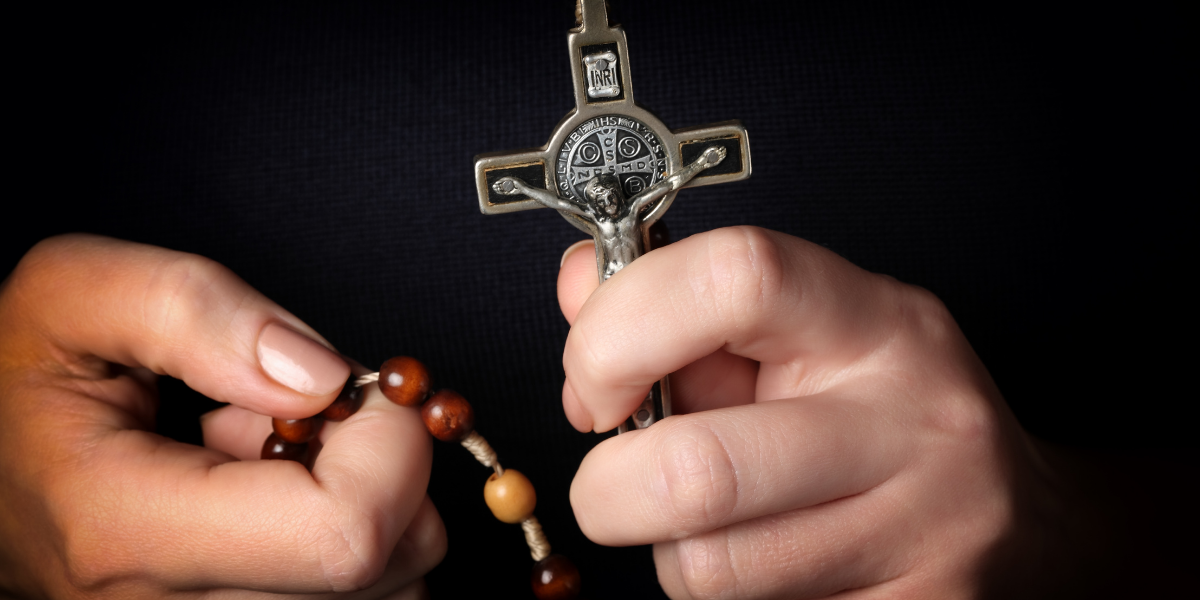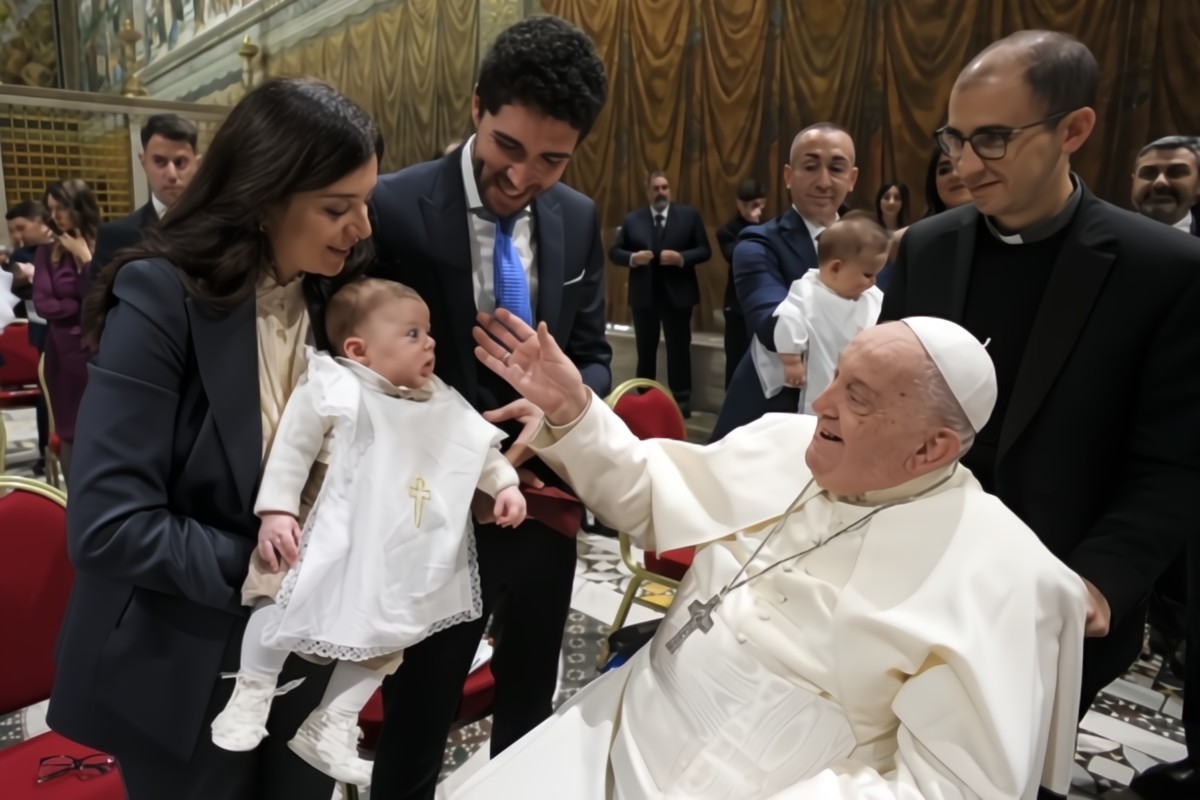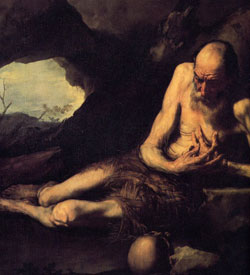 Dear readers, Catholic Online was de-platformed by Shopify for our pro-life beliefs. They shut down our Catholic Online, Catholic Online School, Prayer Candles, and Catholic Online Learning Resources—essential faith tools serving over 1.4 million students and millions of families worldwide. Our founders, now in their 70's, just gave their entire life savings to protect this mission. But fewer than 2% of readers donate. If everyone gave just $5, the cost of a coffee, we could rebuild stronger and keep Catholic education free for all. Stand with us in faith. Thank you. Help Now >
Dear readers, Catholic Online was de-platformed by Shopify for our pro-life beliefs. They shut down our Catholic Online, Catholic Online School, Prayer Candles, and Catholic Online Learning Resources—essential faith tools serving over 1.4 million students and millions of families worldwide. Our founders, now in their 70's, just gave their entire life savings to protect this mission. But fewer than 2% of readers donate. If everyone gave just $5, the cost of a coffee, we could rebuild stronger and keep Catholic education free for all. Stand with us in faith. Thank you. Help Now >
Complimentary Norms for the Apostolic Constitution
FREE Catholic Classes
The Supreme Pontiff Benedict XVI, at the Audience granted to the undersigned Cardinal Prefect, approved these Complementary Norms for the Apostolic Constitution Anglicanorum coetibus.
Highlights
ROME (Catholic Online) - We present the full text of the Complimentary Norms which are a part of the Apostolic Constitution:
*****
Jurisdiction of the Holy See
Article 1
Each Ordinariate is subject to the Congregation for the Doctrine of the Faith. It maintains close relations with the other Roman Dicasteries in accordance with their competence.
Relations with Episcopal Conferences and Diocesan Bishops
Article 2
§1. The Ordinary follows the directives of the national Episcopal Conference insofar as this is consistent with the norms contained in the Apostolic Constitution Anglicanorum coetibus.
§2. The Ordinary is a member of the respective Episcopal Conference.
Article 3
The Ordinary, in the exercise of this office, must maintain close ties of communion with the Bishop of the Diocese in which the Ordinariate is present in order to coordinate its pastoral activity with the pastoral program of the Diocese.
The Ordinary
Article 4
§1. The Ordinary may be a bishop or a presbyter appointed by the Roman Pontiff ad nutum Sanctae Sedis, based on a terna presented by the Governing Council. Canons 383-388, 392-394, and 396-398 of the Code of Canon Law apply to him.
§2. The Ordinary has the faculty to incardinate in the Ordinariate former Anglican ministers who have entered into full communion with the Catholic Church, as well as candidates belonging to the Ordinariate and promoted to Holy Orders by him.
§3. Having first consulted with the Episcopal Conference and obtained the consent of the Governing Council and the approval of the Holy See, the Ordinary can erect as needed territorial deaneries supervised by a delegate of the Ordinary covering the faithful of multiple personal parishes.
The Faithful of the Ordinariate
Article 5
§1. The lay faithful originally of the Anglican tradition who wish to belong to the Ordinariate, after having made their Profession of Faith and received the Sacraments of Initiation, with due regard for Canon 845, are to be entered in the apposite register of the Ordinariate. Those baptized previously as Catholics outside the Ordinariate are not ordinarily eligible for membership, unless they are members of a family belonging to the Ordinariate.
§2. Lay faithful and members of Institutes of Consecrated Life and Societies of Apostolic Life, when they collaborate in pastoral or charitable activities, whether diocesan or parochial, are subject to the Diocesan Bishop or to the pastor of the place; in which case the power of the Diocesan Bishop or pastor is exercised jointly with that of the Ordinary and the pastor of the Ordinariate.
The Clergy
Article 6
§1. In order to admit candidates to Holy Orders the Ordinary must obtain the consent of the Governing Council. In consideration of Anglican ecclesial tradition and practice, the Ordinary may present to the Holy Father a request for the admission of married men to the presbyterate in the Ordinariate, after a process of discernment based on objective criteria and the needs of the Ordinariate. These objective criteria are determined by the Ordinary in consultation with the local Episcopal Conference and must be approved by the Holy See.
§2. Those who have been previously ordained in the Catholic Church and subsequently have become Anglicans, may not exercise sacred ministry in the Ordinariate. Anglican clergy who are in irregular marriage situations may not be accepted for Holy Orders in the Ordinariate.
§3. Presbyters incardinated in the Ordinariate receive the necessary faculties from the Ordinary.
Article 7
§1. The Ordinary must ensure that adequate remuneration be provided to the clergy incardinated in the Ordinariate, and must provide for their needs in the event of sickness, disability, and old age.
§2. The Ordinary will enter into discussion with the Episcopal Conference about resources and funds which might be made available for the care of the clergy of the Ordinariate.
§3. When necessary, priests, with the permission of the Ordinary, may engage in a secular profession compatible with the exercise of priestly ministry (cf. CIC, can. 286).
Article 8
§1. The presbyters, while constituting the presbyterate of the Ordinariate, are eligible for membership in the Presbyteral Council of the Diocese in which they exercise pastoral care of the faithful of the Ordinariate (cf. CIC, can. 498, §2).
§2. Priests and Deacons incardinated in the Ordinariate may be members of the Pastoral Council of the Diocese in which they exercise their ministry, in accordance with the manner determined by the Diocesan Bishop (cf. CIC, can. 512, §1).
Article 9
§1. The clerics incardinated in the Ordinariate should be available to assist the Diocese in which they have a domicile or quasi-domicile, where it is deemed suitable for the pastoral care of the faithful. In such cases they are subject to the Diocesan Bishop in respect to that which pertains to the pastoral charge or office they receive.
§2. Where and when it is deemed suitable, clergy incardinated in a Diocese or in an Institute of Consecrated Life or a Society of Apostolic Life, with the written consent of their respective Diocesan Bishop or their Superior, can collaborate in the pastoral care of the Ordinariate. In such case they are subject to the Ordinary in respect to that which pertains to the pastoral charge or office they receive.
§3. In the cases treated in the preceding paragraphs there should be a written agreement between the Ordinary and the Diocesan Bishop or the Superior of the Institute of Consecrated Life or the Moderator of the Society of Apostolic Life, in which the terms of collaboration and all that pertains to the means of support are clearly established.
Article 10
§1. Formation of the clergy of the Ordinariate should accomplish two objectives: 1) joint formation with diocesan seminarians in accordance with local circumstances; 2) formation, in full harmony with Catholic tradition, in those aspects of the Anglican patrimony that are of particular value.
§2. Candidates for priestly ordination will receive their theological formation with other seminarians at a seminary or a theological faculty in conformity with an agreement concluded between the Ordinary and, respectively, the Diocesan Bishop or Bishops concerned. Candidates may receive other aspects of priestly formation at a seminary program or house of formation established, with the consent of the Governing Council, expressly for the purpose of transmitting Anglican patrimony.
§3. The Ordinariate must have its own Program of Priestly Formation, approved by the Holy See; each house of formation should draw up its own rule, approved by the Ordinary (cf. CIC, can. 242, §1).
§4. The Ordinary may accept as seminarians only those faithful who belong to a personal parish of the Ordinariate or who were previously Anglican and have established full communion with the Catholic Church.
§5. The Ordinariate sees to the continuing formation of its clergy, through their participation in local programs provided by the Episcopal Conference and the Diocesan Bishop.
Former Anglican Bishops
Article 11
§1. A married former Anglican Bishop is eligible to be appointed Ordinary. In such a case he is to be ordained a priest in the Catholic Church and then exercises pastoral and sacramental ministry within the Ordinariate with full jurisdictional authority.
§2. A former Anglican Bishop who belongs to the Ordinariate may be called upon to assist the Ordinary in the administration of the Ordinariate.
§3. A former Anglican Bishop who belongs to the Ordinariate may be invited to participate in the meetings of the Bishops' Conference of the respective territory, with the equivalent status of a retired bishop.
§4. A former Anglican Bishop who belongs to the Ordinariate and who has not been ordained as a bishop in the Catholic Church, may request permission from the Holy See to use the insignia of the episcopal office.
The Governing Council
Article 12
§1. The Governing Council, in accord with Statutes which the Ordinary must approve, will have the rights and responsibilities accorded by the Code of Canon Law to the College of Consultors and the Presbyteral Council.
§2. In addition to these responsibilities, the Ordinary needs the consent of the Governing Council to:
a) admit a candidate to Holy Orders;
b) erect or suppress a personal parish;
c) erect or suppress a house of formation;
d) approve a program of formation.
§3. The Ordinary also consults the Governing Council concerning the pastoral activities of the Ordinariate and the principles governing the formation of clergy.
§4. The Governing Council has a deliberative vote:
a. when choosing a terna of names to submit to the Holy See for the appointment of the Ordinary;
b. when proposing changes to the Complementary Norms of the Ordinariate to present to the Holy See;
c. when formulating the Statutes of the Governing Council, the Statutes of the Pastoral Council, and the Rule for houses of formation.
§ 5. The Governing Council is composed according to the Statutes of the Council. Half of the membership is elected by the priests of the Ordinariate.
The Pastoral Council
Article 13
§1. The Pastoral Council, constituted by the Ordinary, offers advice regarding the pastoral activity of the Ordinariate.
§2. The Pastoral Council, whose president is the Ordinary, is governed by Statutes approved by the Ordinary.
The Personal Parishes
Article 14
§1. The pastor may be assisted in the pastoral care of the parish by a parochial vicar, appointed by the Ordinary; a pastoral council and a finance council must be established in the parish.
§2. If there is no vicar, in the event of absence, incapacity, or death of the pastor, the pastor of the territorial parish in which the church of the personal parish is located can exercise his faculties as pastor so as to supply what is needed.
§3. For the pastoral care of the faithful who live within the boundaries of a Diocese in which no personal parish has been erected, the Ordinary, having heard the opinion of the local Diocesan Bishop, can make provisions for quasi-parishes (cf. CIC, can. 516, §1).
The Supreme Pontiff Benedict XVI, at the Audience granted to the undersigned Cardinal Prefect, approved these Complementary Norms for the Apostolic Constitution Anglicanorum coetibus, adopted in the Ordinary Session of the Congregation, and ordered their publication.
Rome, from the Offices of the Congregation for the Doctrine of the Faith, November 4, 2009, the Memorial of St. Charles Borromeo.
William Card. Levada
Prefect
+ Luis. F. Ladaria, S.I.
Titular Archbishop of Thibica
Secretary
---
'Help Give every Student and Teacher FREE resources for a world-class Moral Catholic Education'
Copyright 2021 - Distributed by Catholic Online
Join the Movement
When you sign up below, you don't just join an email list - you're joining an entire movement for Free world class Catholic education.

-

-
Mysteries of the Rosary
-
St. Faustina Kowalska
-
Litany of the Blessed Virgin Mary
-
Saint of the Day for Wednesday, Oct 4th, 2023
-
Popular Saints
-
St. Francis of Assisi
-
Bible
-
Female / Women Saints
-
7 Morning Prayers you need to get your day started with God
-
Litany of the Blessed Virgin Mary
Introducing 'Journey with the Messiah' - A Revolutionary Way to Experience the Bible
-

9 Harmful Practices to Avoid When Confronting the Devil
-

Pope Francis Celebrates the Feast of the Baptism of the Lord with Special Emphasis on the Gift of Faith
-
New Respiratory Virus Spreads Across China: Is it a Threat to the Global Community?
-
Resurgent Nuclear Threats and the Call for Peace
Daily Catholic
 Daily Readings for Wednesday, January 15, 2025
Daily Readings for Wednesday, January 15, 2025 St. Paul the Hermit: Saint of the Day for Wednesday, January 15, 2025
St. Paul the Hermit: Saint of the Day for Wednesday, January 15, 2025 Prayer for a Blessing on the New Year: Prayer of the Day for Tuesday, December 31, 2024
Prayer for a Blessing on the New Year: Prayer of the Day for Tuesday, December 31, 2024- Daily Readings for Tuesday, January 14, 2025
- St. Felix of Nola: Saint of the Day for Tuesday, January 14, 2025
- St. Theresa of the Child Jesus: Prayer of the Day for Monday, December 30, 2024
![]()
Copyright 2024 Catholic Online. All materials contained on this site, whether written, audible or visual are the exclusive property of Catholic Online and are protected under U.S. and International copyright laws, © Copyright 2024 Catholic Online. Any unauthorized use, without prior written consent of Catholic Online is strictly forbidden and prohibited.
Catholic Online is a Project of Your Catholic Voice Foundation, a Not-for-Profit Corporation. Your Catholic Voice Foundation has been granted a recognition of tax exemption under Section 501(c)(3) of the Internal Revenue Code. Federal Tax Identification Number: 81-0596847. Your gift is tax-deductible as allowed by law.








 Daily Readings for Wednesday, January 15, 2025
Daily Readings for Wednesday, January 15, 2025 St. Paul the Hermit: Saint of the Day for Wednesday, January 15, 2025
St. Paul the Hermit: Saint of the Day for Wednesday, January 15, 2025 Prayer for a Blessing on the New Year: Prayer of the Day for Tuesday, December 31, 2024
Prayer for a Blessing on the New Year: Prayer of the Day for Tuesday, December 31, 2024

